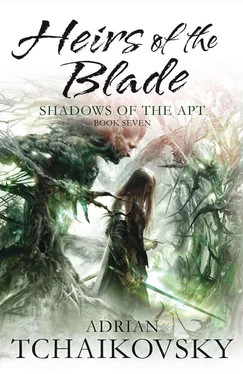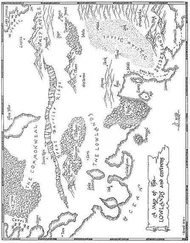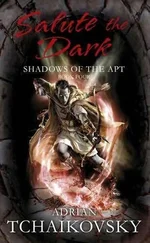Adrian Tchaikovsky - Heirs of the Blade
Здесь есть возможность читать онлайн «Adrian Tchaikovsky - Heirs of the Blade» весь текст электронной книги совершенно бесплатно (целиком полную версию без сокращений). В некоторых случаях можно слушать аудио, скачать через торрент в формате fb2 и присутствует краткое содержание. Жанр: Фэнтези, на английском языке. Описание произведения, (предисловие) а так же отзывы посетителей доступны на портале библиотеки ЛибКат.
- Название:Heirs of the Blade
- Автор:
- Жанр:
- Год:неизвестен
- ISBN:нет данных
- Рейтинг книги:4 / 5. Голосов: 1
-
Избранное:Добавить в избранное
- Отзывы:
-
Ваша оценка:
- 80
- 1
- 2
- 3
- 4
- 5
Heirs of the Blade: краткое содержание, описание и аннотация
Предлагаем к чтению аннотацию, описание, краткое содержание или предисловие (зависит от того, что написал сам автор книги «Heirs of the Blade»). Если вы не нашли необходимую информацию о книге — напишите в комментариях, мы постараемся отыскать её.
Heirs of the Blade — читать онлайн бесплатно полную книгу (весь текст) целиком
Ниже представлен текст книги, разбитый по страницам. Система сохранения места последней прочитанной страницы, позволяет с удобством читать онлайн бесплатно книгу «Heirs of the Blade», без необходимости каждый раз заново искать на чём Вы остановились. Поставьте закладку, и сможете в любой момент перейти на страницу, на которой закончили чтение.
Интервал:
Закладка:
Then the talking was done. In the end it was Colonel Lien who finished it. Lean and stone-bald, and yet barely Angved’s senior for all that, he spoke quietly and with purpose, and all the others listened. He even cut the Rekef man off with a sharp gesture when an interruption was threatened. We are decided, Lien’s stance said, and nobody challenged him on it.
He was the first to leave, stepping down from the dais and striding towards the door. He slowed, though, as he neared the two prisoners: grey-haired Angved and the raggedly hirsute Varsec. His calculating eyes flicked between them, and on his face the distaste could not quite edge out something more thoughtful. On a younger, less cynical man it might have been hope.
After that, the guards dragged Angved out, but not back to the factory. He learned soon enough that the Engineers had their own cells beneath Severn Hill, windowless and comfortless save for a pallet bed and the constant glare of gaslight. Angved had reckoned that he’d had enough of the sun out in the desert, but spending a day sealed underground did away with any such illusion.
When he awoke, stiff and aching from the hard bed, he found his jailers had already been and gone. They had left him some water, a jug of weak beer, and some stew that had at least seen some meat around the time it was cooked. Luxury it was not, but nor was it food to waste on anyone facing a death sentence. More important than that, though, they had left him a book. It was slim, densely typeset and printed in the manner of all Engineering Corps texts, but certainly nothing on the standard syllabus. It was something new.
He looked at the title page, holding it up to the hissing lamp.
Towards an Efficient Mechanized Air Force, its Design and Deployment. Beneath that was stamped the name and rank of the author: Varsec, Captain, Southern Expeditionary Aviation Corps.
For a moment Angved was quite blank as to why he might have been passed this document, but some helpful clerk had already thought of that, and a stub of black tape marked out a particular page towards the end of the book. The section there dealt with key problems that the author, Varsec, had not been able to solve. Angved had to read it three times before the pieces clicked into exquisite place in his mind, and it was all he could do to stop himself whooping in the narrow confines of his cell.
He read, from start to finish despite the poor light, devouring Varsec’s words voraciously, poring over the diagrams, the carefully printed sketches and schematics depicting wings, streamlined bodies, joints and couplings. He skipped only those sections that dealt with Varsec’s mooted reorganization of the Aviation Corps, for that interested him not in the slightest. He had eyes only for the technical specifications.
At the end of it, he put the book down and just stared at the wall, his mind’s eye painting it with all the wonderful colours of the future.
Stab me, he thought, but we’ll take down every last living one of them. The Lowlands won’t know what’s hit it.
Nine
Khanaphes, city of a hundred thousand years – or, at least, old enough that calendars failed to have any relevance. Even the ancient, opaque system of the Moth-kinden, with its animal years marching in erratic and seemingly random procession, was nevertheless younger than this ancient city. The Collegiate dating system, so popular now, had yet to reach the year 550. Perhaps Khanaphes possessed its own calendar, but if so it was locked in the ubiquitous, impenetrable carvings that were incised on every wall and every stone surface. The locals themselves did not count the years. Time for them was the year’s cycle: the flooding and the growing and the harvest, year without end, lives lived in annual segments that followed precisely the footprints that parents and grandparents and more distant ancestors had trodden. The Khanaphir had no use for time’s progressive arrow.
But that had changed.
The Khanaphir themselves, those solid, shaven-headed Beetle-kinden, were doing their best to pretend that they still possessed that unbroken line back into the deepest past. All of them, farmers, traders, clerks, soldiers and artisans, they were desperately mumming the lives that they remembered from only a year or so before, casting themselves in the grand mystery play of eternal Khanaphes. It was a lie, though, for change had come to Khanaphes with two swift dagger strikes: the first to wound and the second even now poised above them, ready to kill.
The Many of Nem, the wild Scorpion-kinden, had always been their enemies, and the Khanaphir had fought them since time out of mind, as part of their eternal rote. When they had come last, though, the Scorpions had brought new weapons, allegedly gifted to them by the Wasp Empire, and with these they had knocked holes in Khanaphes’s walls and rampaged through half the city. That they had been driven away at last did not go far towards disguising the damage they had done or the appalling number of the city’s people they had slain.
Still, had the city been left to its own devices, the old timeless cloak might have fallen across it once more. History is insistent, though, and now it had its hooks into Khanaphes. It was not long after the attack of the Many that the Empire had arrived.
Word had come to Collegium swiftly, following on the heels of the scholarly visitors who had become caught up in the fighting with the Nem. Scarcely had they returned home than some of them were embarking again, finding the first airship back east, bound for Solarno and the Exalsee and, from there, to Khanaphes.
Or not quite Khanaphes. Word had come that the Imperial hold on the city was tight, as always the case with a new addition to the Empire. The harbour was crawling with black and gold, and any ships that docked were subjected to a rigorous search. Still, there were plenty of convenient places to hide on a merchantman, and Praeda and Amnon might have risked it had they managed to find a ship’s captain willing to chance his cargo being confiscated by the Wasps’ Consortium.
Praeda Rakespear was a College scholar, an artificer and architect, young and keen-minded and mostly fed up with Collegium’s hidebound attitudes these days, whether it was towards foreign policy or the advancement of female academics. Back in Collegium, she had cultivated a reputation as possessing armour that was proof against any man’s advances. The presence of Amnon at her side was testimony to the only time that armour had been breached.
Amnon was Khanaphir, although he was now wearing Lowlander clothes. He was huge, massive-shouldered, tall and broad, and yet swift and precise with it, a true warrior’s warrior. In Khanaphes he had been their First Soldier, who led their armies and organized the city’s military forces. He had been exiled, too, which was just one of the topics that he and Praeda had not got around to discussing.
Their transport was a Solarnese ship, low and single-masted, that crept up the coast of the Sunroad sea until the desert had given way to the marshy delta of the Jamail. The vessel’s master, a lean woman, with grey hair shading to white and her sand-coloured face sun-weathered, had her two-man crew set a fire on an islet there, settling down to wait for the unnamed parties she was to meet. Praeda and Amnon knew little of her business, save that the protocols she was following had been put in place in case business went bad – and Imperial invasions certainly counted as that.
‘You did something like this when the Scorpions attacked?’ Praeda dared to ask.
The master nodded briefly. ‘He showed up then, sure enough, with bags all packed,’ was all she would say.
‘This friend of yours, he can help us into the city?’ Praeda pressed.
Читать дальшеИнтервал:
Закладка:
Похожие книги на «Heirs of the Blade»
Представляем Вашему вниманию похожие книги на «Heirs of the Blade» списком для выбора. Мы отобрали схожую по названию и смыслу литературу в надежде предоставить читателям больше вариантов отыскать новые, интересные, ещё непрочитанные произведения.
Обсуждение, отзывы о книге «Heirs of the Blade» и просто собственные мнения читателей. Оставьте ваши комментарии, напишите, что Вы думаете о произведении, его смысле или главных героях. Укажите что конкретно понравилось, а что нет, и почему Вы так считаете.












